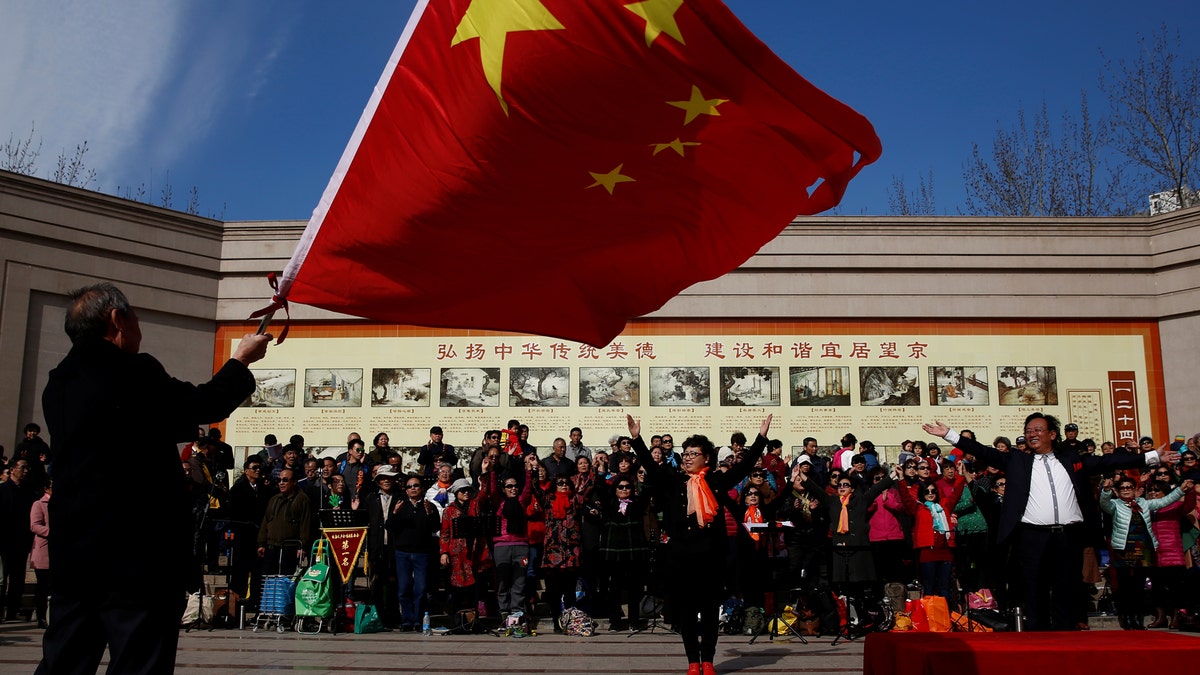
File photo: A man waves the Chinese national flag as an amateur choir performs in a park in a residential neighborhood in Beijing, China February 28, 2017. (REUTERS/Thomas Peter)
China's chilling dictatorship is moving quickly to introduce social scorecards, in which all citizens will be monitored 24/7 and ranked on their behavior.
The Communist Party’s plan is for every one of its 1.4 billion citizens to be at the whim of a dystopian social credit system, and it’s on track to be fully operational by the year 2020.
An active pilot program has already seen millions of people each assigned a score out of 800 and either reap its benefits or suffer its consequences — depending on which end of the scale they sit.
Under the social credit scheme, points are lost and gained based on readings from a sophisticated network of 200 million surveillance cameras — a figure set to triple in 18 months.
The program has been enabled by rapid advances in facial recognition, body scanning and geo-tracking.
The data is combined with information collected from individuals’ government records — including medical and educational — along with their financial and internet browsing histories. Overall scores can go up and down in “real time” dependant on the person’s behaviour but they can also be affected by people they associate with.
“If your best friend or your dad says something negative about the government, you’ll lose points too,” the ABC reports.
The mandatory “social credit” system was first announced in 2014 in a bid to reinforce the notion that “keeping trust is glorious and breaking trust is disgraceful,” according to a government document.
In a Foreign Correspondent episode, to air on the ABC tonight, financial credit system Alipay, Tianjin general manager Jie Cong, summarised the system in black and white.
“If people keep their promises they can go anywhere in the world,” he said. “If people break their promises they won’t be able to move an inch!”
MODEL CITIZENS
Under the system, those deemed to be “top citizens” are rewarded bonus points.
The benefits of being ranked on the higher end of the scale include waived deposits on hotels and rental cars, VIP treatment at airports, discounted loans, priority job applications and fast-tracking to the most prestigious universities.
Dandan, a young mother and marketing professional, is proud of her high score. If she keeps it up her infant son will be more likely to get into a top school.
“China likes to experiment in this creative way … I think people in every country want a stable and safe society,” she said.
“We need a social credit system. We hope we can help each other, love each other and help everyone to become prosperous.”
BOTTOM OF THE SCALE
But it doesn’t take much to end up on the wrong side of the scale with an estimated 10 million people are already paying the price of a low rating.
Jaywalking, late payments on bills or taxes, buying too much alcohol or speaking out against the government, each cost citizens points.
Other mooted punishable offences include spending too long playing video games, wasting money on frivolous purchases and posting on social media, according to Business Insider.
Penalties range from losing the right to travel by plane or train, social media account suspensions and being barred from government jobs.
Chinese journalist Liu Hu is one of millions who have already amassed a low social credit rating. Liu Hu was arrested, jailed and fined after he exposed official corruption.
“The government regards me as an enemy,” Liu Hu told the ABC.
He is now banned from travelling by plane or fast train. His social media accounts with millions of followers have been suspended. He struggles to find work.
“This kind of social control is against the tide of the world. The Chinese people’s eyes are blinded and their ears are blocked. They know little about the world and are living in an illusion.” Liu Hu said.
Seventeen people who refused to carry out military service were last year barred from enrolling in higher education, applying for high school, or continuing their studies, Beijing News reported.
Uighur poet and filmmaker, Tahir Hamut, who fled to the US, told the ABC that China’s surveillance system “suddenly ramped up after the end of 2016”.
“Since then, advanced surveillance technology which we’ve never seen, never experienced, never heard of, started appearing,” he said.
This story originally appeared in news.com.au.








































